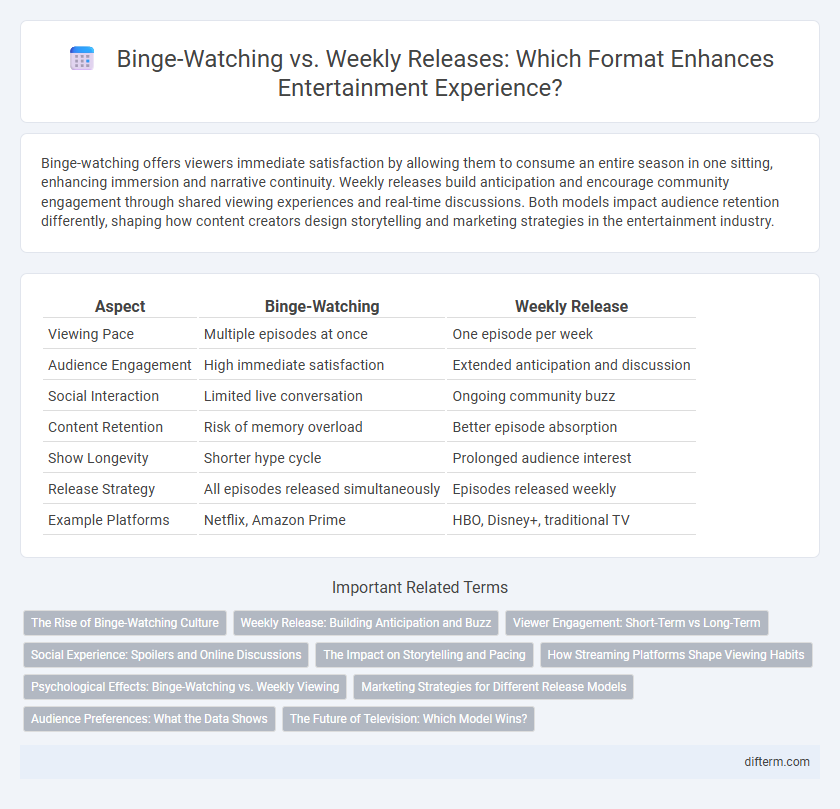Binge-watching offers viewers immediate satisfaction by allowing them to consume an entire season in one sitting, enhancing immersion and narrative continuity. Weekly releases build anticipation and encourage community engagement through shared viewing experiences and real-time discussions. Both models impact audience retention differently, shaping how content creators design storytelling and marketing strategies in the entertainment industry.
Table of Comparison
| Aspect | Binge-Watching | Weekly Release |
|---|---|---|
| Viewing Pace | Multiple episodes at once | One episode per week |
| Audience Engagement | High immediate satisfaction | Extended anticipation and discussion |
| Social Interaction | Limited live conversation | Ongoing community buzz |
| Content Retention | Risk of memory overload | Better episode absorption |
| Show Longevity | Shorter hype cycle | Prolonged audience interest |
| Release Strategy | All episodes released simultaneously | Episodes released weekly |
| Example Platforms | Netflix, Amazon Prime | HBO, Disney+, traditional TV |
The Rise of Binge-Watching Culture
The rise of binge-watching culture has transformed entertainment consumption by encouraging viewers to watch multiple episodes or entire seasons in a single sitting, increasing viewer engagement and subscription retention for streaming platforms. This shift contrasts with the traditional weekly release model, which prolongs audience anticipation and fosters ongoing social media discussions around each episode. Streaming giants like Netflix have heavily capitalized on binge-watching, influencing content production and marketing strategies to maintain high viewer retention rates.
Weekly Release: Building Anticipation and Buzz
Weekly release schedules foster sustained audience engagement by creating ongoing anticipation and conversation around each new episode. This format encourages viewers to speculate on plot developments and share theories, amplifying social media buzz and community interaction. Studios benefit from prolonged visibility and a steady stream of viewer metrics, enhancing overall show longevity and cultural impact.
Viewer Engagement: Short-Term vs Long-Term
Binge-watching drives intense short-term viewer engagement by allowing audiences to consume multiple episodes rapidly, creating immediate buzz and social media activity. Weekly releases sustain long-term engagement, fostering ongoing discussions and anticipation that maintains viewer interest over months. Streaming platforms strategically balance these release models to maximize retention and optimize viewer loyalty.
Social Experience: Spoilers and Online Discussions
Binge-watching allows viewers to consume entire seasons at their own pace, minimizing the risk of encountering spoilers and reducing real-time online discussions. Weekly releases generate anticipation and active engagement, fostering communal conversations and shared reactions across social media platforms. This staggered approach enhances the social experience by creating a collective timeline for fan interaction and speculation.
The Impact on Storytelling and Pacing
Binge-watching alters storytelling by encouraging faster plot progression and continuous cliffhangers to maintain viewer engagement, often resulting in denser narratives with fewer episodic resolutions. Weekly releases enable storytellers to build suspense and character development gradually, allowing audiences time to digest and speculate between episodes, which can enhance emotional investment. The pacing in weekly formats supports episodic narratives, while binge consumption drives serialized, tightly woven storylines optimized for rapid consumption.
How Streaming Platforms Shape Viewing Habits
Streaming platforms shape viewing habits by offering flexible content delivery models, such as binge-watching entire seasons or weekly episode releases. Binge-watching fosters continuous engagement and deep narrative immersion, increasing platform retention rates and viewer satisfaction. Weekly releases create anticipation and prolonged conversations on social media, enhancing communal experiences and sustained subscriber interest.
Psychological Effects: Binge-Watching vs. Weekly Viewing
Binge-watching often leads to heightened emotional engagement and instant gratification, which can trigger dopamine release and potentially increase addictive behaviors. Weekly release schedules promote anticipation and sustained interest, allowing time for reflection and social discussion that can enhance emotional processing and reduce viewer burnout. Psychological studies suggest that pacing content delivery influences not only cognitive absorption but also overall mental well-being and content satisfaction.
Marketing Strategies for Different Release Models
Binge-watching leverages instant gratification, driving rapid word-of-mouth and social media buzz, which marketers capitalize on through concentrated campaigns and targeted ads during the release window. Weekly releases sustain audience engagement over a longer period, allowing marketers to build anticipation with episodic teasers, interactive content, and influencer partnerships that encourage consistent viewer retention. Tailoring marketing strategies to the release model enhances audience connection, maximizes visibility, and boosts subscription or viewership metrics effectively.
Audience Preferences: What the Data Shows
Data indicates that binge-watching appeals to viewers seeking instant gratification, with platforms like Netflix reporting increased engagement during full-season releases. Conversely, weekly releases sustain long-term audience interaction, as seen in HBO's Game of Thrones, which maintained high social media activity over several months. Surveys reveal a split preference: younger demographics favor binge-watching for convenience, while older viewers appreciate the anticipation and community discussions fostered by weekly episodes.
The Future of Television: Which Model Wins?
Binge-watching drives immediate engagement with entire seasons available at once, catering to on-demand consumption patterns and boosting subscriber retention for streaming platforms. Weekly releases sustain long-term audience interest by fostering anticipation, community discussions, and consistent viewership metrics that attract advertisers. The future of television lies in hybrid models that combine binge availability for core content with weekly drops to maintain buzz and maximize both viewer satisfaction and monetization.
binge-watching vs weekly release Infographic

 difterm.com
difterm.com